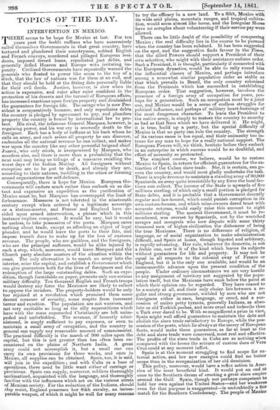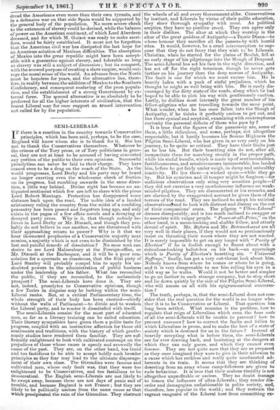TOPICS OF THE DAY.
INTERVENTION IN MEXICO. THERE seems to be hope for Mexico at last. For ten years past the feeble ruffians who have successively called themselves Governments in that great country, have tortured and plundered their countrymen, robbed English and French convoys, murdered and pillaged European resi- dents, imposed forced loans, repudiated just debts, and generally defied Heaven and Europe with irritating im- punity. Civilized Governments have repeatedly warned the generals who floated to power like scum to the top of a ditch, that the law of nations was for them at an end, and that they should be held at the fitting date personally liable for their evil deeds. Justice, however, is slow when its action is expensive, and ruler after ruler confident in the protection of his deserts and the turmoil of European affairs, has increased exactions upon foreign property anddinumshed i the guarantees for foreign life. The savage who s now Pre- sident is comparatively humane, and only repudiates debts the country is pledged by agreement to pay, and plunders property the country is bound by international law to pro- tect. His rival, the infamous General Marquez, however, is regaining power, and his war cry is avowedly death to the foreigner. Each has a body of ruffians at his back whom he calls an army, and each seizes all property he can discover, embezzles all the national revenue he can collect, and makes war upon the country like any other powerful brigand chief. Juarez , who only steals, is overpowered by Marquez, who murders also, and there is more than a probability that the next mail may bring us tidings of a massacre recalling the worst days of the Indian Mutiny. All foreigners without exception are to be put to death, and already they are, according to their natures, huddling in the cities or forming armed organizations for self-defence. Consequently, there is hope for Mexico. European Go- vernments will endure much rather than embark on so dis- tant and expensive an expedition as the pacification of Mexico must be, but Marquez has overstepped the limit of forbearance. Massacre is not tolerated in the nineteenth century except when ordered by a legitimate sovereign or a station-master, and France and England have de- cided upon armed intervention, a phrase which in this instance implies conquest. It would be easy, but it would be useless, to take possession of the ports. Marquez cares nothing about trade, except as affording an object of legal plunder, and he would leave the ports to their fate, and impose transit dues to make up for the loss of customs revenue. The people, who are guiltless, and the foreigners, who are the principal sufferers, would be alike injured by such a step, which, moreover, would leave Marquez and the Church party absolute masters of the situation within the coast. The only alternative is to march an army into the interior, seize the capital, and establish a Government which can give guarantees both for the lives of foreigners and the redemption of the large outstanding debts. Such an expe- dition, though formidable on paper, presents only one serious military difficulty. Ten thousand English and French troops would destroy any force the Mexicans are likely to collect to \oppose the invaders. The property-holders would be only too rejoiced at a revolution which promised them some decent measure of security, some respite from incessant terror and exaction. The population are not warriors, and not very. excitable so long as the silly superstitions which have with the mass superseded Christianity are left unim- peded and unforbidden. The revenue, if honestly admi- nistered, is amply sufficient to pay expenses, or even to maintain a small army of occupation, and the country in general can supply any reasonable amount of commissariat. The practical difficulty is the march of 300 miles upon the capital, but this is not greater than has often been en- countered on the plains of Northern India. A great army could not accomplish it, but a small one can carry its own provisions for three weeks, and once in Mexico, all supplies can be obtained. Spain, too, it is said, will join in the expedition ; and with Cuba as a base of operations, there need be little want either of carriage or provisions. Spain can supply, moreover, soldiers thoroughly acclimatized, acquainted with the language, and thoroughly familiar with the influences which act on the various strata of Mexican society. For the reduction of the Indians, should they resist, England possesses her Sikh cavalry, an incom- parable weapon, of which it might be well for many miaow to try the efficacy in a new land. To a Sikh, Mexico with its wide arid plains, mountain ranges, and tropical cultiva- tion, would seem almost like home, and the Irregular Horse have no scruples about volunteering if their service pay were allowed.
There can be little doubt of the possibility of conquering Mexico ; the real difficulty lies in the course to be pursued when the country has been subdued. It has been suggested on the spot, and the suggestion finds favour in the Time, that the allied Powers should support a President of their own selection, who might with their assistance enforce order. Such a President, it is thought, particularly if connected with the European dynasties, would be able to rally round him the influential classes of Mexico, and perhaps introduce among a somewhat similar population order as stable as that which prevails in Brazil, the only country colonized from the Peninsula which has succeeded in establishing European order. That suggestion, however, involves the presence of a foreign army of occupation for years, per- haps for a generation. Such an occupation must be a joint one, and Mexico would be a scene of endless struggles for political influence, and perhaps of military heart-burnings of the most dangerous character. To leave the President to the native army, is simply to restore the country to anarchy as bad as that from which we have delivered it. He might, it is true, build up a party, but the special difficulty of Mexico is that no party can rule the country. The strength of its various races is too equal, and their animosity too in- tense for any man to hope for a really national support. The European Powers will, we think, hesitate before they embark in an enterprise in which success would be so doubtful, and effort of necessity so protracted. The simplest course, we believe, would be to restore Mexico to Spain, in return for efficient guarantees for the ex- tinction of the Cuban slave trade. She, it is certain, can go- vern the country, and would most gladly undertake the task. There is ample revenue to maintain a standing army of 30,000 Spaniards, an army quite irresistible by any force the local fac- tions can collect. The income of the State is upwards of five millions sterling, of which only a small portion is pledged for State debts, and it is probable that a Government decently regular and law-honest, which could punish corruption in its own custom-houses, and which mine-owners dared trust with accurate returns, would easily raise this amount to eight millions sterling. The ancient Government, it must be re- membered, was overset by Spaniards, not by the wretched savages and mongrels who now dispute with some thirty thousand men of higher civilization the dishonour of being the true Mexicans. There is no difference of religion, of language, or of social organization to make administration difficult, and Spain at home, though bigoted and arbitrary, is rapidly advancing. Her rule, whatever its demerits, is not a feeble one, nor is it of the kind which leaves its subjects without guarantees for life and property. It may not be equal in all respects to the colonial sway of France or England, but it is the only one available, and would be an immeasurable advance upon the present condition of the people. Under ordinary circumstances we are very hostile to any assignment of territory not suggested by the popu- lation itself, but the Mexicans have sunk below the point at which their opinion can be regarded. They have ceased to be a society at all, and their only choice lies between a re- gular and strong government, wielded by men who are not foreigners either in race, language, or creed, and a suc- cession of native petty tyrants, generally Indians, as abso- lute as old Turkish pashas, and more cruel and imbecile than a Turk ever dared to be. With so magnificent a prize in view, Spain might well afford guarantees to maintain the debt and abolish the slave trade satisfactory to Europe, while the pos- session of the ports, which lie always at the mercy of European fleets, would make these guarantees, as far at least as the debt and slave trade were concerned, most real and effective. The profits of the slave trade in Cuba are as nothing when compared with the losses the seizure of custom dues of Vera Cruz could at any moment inflict. Spain is at this moment struggling to find scope for ex- ternal action, and her new energies could find no better scope than in the reorganization of her old dominion. This policy, moreover, would have a reflex action in Ame- rica of the most beneficial kind. It would put an end at once to the Southern dream of erecting a great slave empire around the Gulf. Spain, though not perhaps competent to hold her own against the United States—and her weakness . even for that purpose is exaggerated—is -undoubtedly a fur match for the Southern Confederacy. The people of Mexico dread the Americans even more than their own tyrants, and in a defensive war on that aide Spain would be supported by the general body of the population. No more severe check to the extension of slavery could be devised, while the balance of power on the American continent, of which Lord Aberdeen dreamed, and for which M. Guizot was ready to make sacri- fices, would be fairly established. It must not be forgotten that the American civil war has dissipated the last hope for an American solution of Mexican difficulties. The absorption of Mexico into the great republic might have been accept- able with a guarantee against slavery, and tolerable so long as slavery was still a subject of discussion ; but its conquest, with the avowed purpose of creating a slave empire, would out- rage the moral sense of the world. An advance from the North must be hopeless for years, and the alternative lies, there- fore, in reality between the addition of Mexico to the Southern Confederacy, and consequent enslaving of the peon popula- tion, and the establishment of a strong Government by ex- ternal force. The second alternative is so absolutely to be preferred for all the higher interests of civilization, that the truest Liberal may for once support an armed intervention not called for by the population.































 Previous page
Previous page